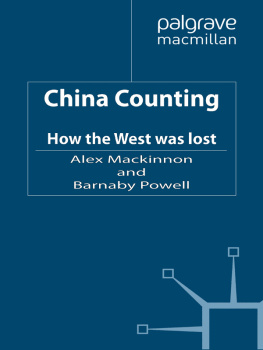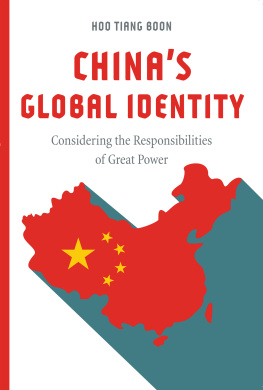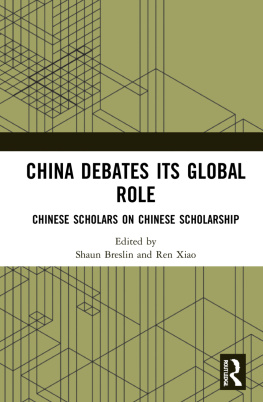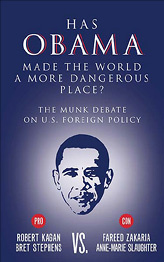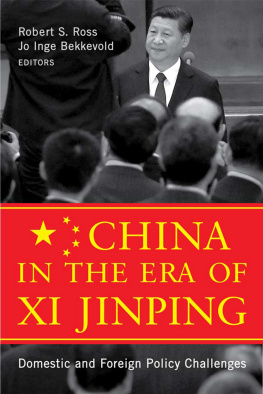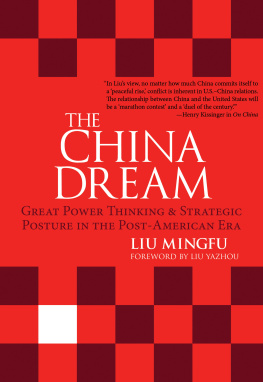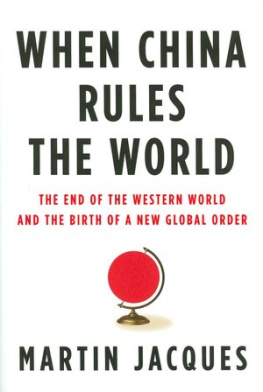China Counting
China Counting
How the West was lost
Alex Mackinnon
and
Barnaby Powell


Alex Mackinnon and Barnaby Powell 2010
All rights reserved. No reproduction, copy or transmission of this publication may be made without written permission.
No portion of this publication may be reproduced, copied or transmitted save with written permission or in accordance with the provisions of the Copyright, Designs and Patents Act 1988, or under the terms of any licence permitting limited copying issued by the Copyright Licensing Agency, Saffron House, 610 Kirby Street, London EC1N 8TS.
Any person who does any unauthorized act in relation to this publication may be liable to criminal prosecution and civil claims for damages.
The author has asserted his right to be identified as the author of this work in accordance with the Copyright, Designs and Patents Act 1988.
First published 2010 by
PALGRAVE MACMILLAN
Palgrave Macmillan in the UK is an imprint of Macmillan Publishers Limited, registered in England, company number 785998, of Houndmills, Basingstoke, Hampshire RG21 6XS.
Palgrave Macmillan in the US is a division of St Martin's Press LLC, 175 Fifth Avenue, New York, NY 10010.
Palgrave Macmillan is the global academic imprint of the above companies and has companies and representatives throughout the world.
Palgrave and Macmillan are registered trademarks in the United States, the United Kingdom, Europe, and other countries.
ISBN: 978-0-230-23403-1
This book is printed on paper suitable for recycling and made from fully managed and sustained forest sources. Logging, pulping and manufacturing processes are expected to conform to the environmental regulations of the country of origin.
A catalogue record for this book is available from the British Library.
A catalog record for this book is available from the Library of Congress.
10 9 8 7 6 5 4 3 2 1
19 18 17 16 15 14 13 12 11 10
Printed and bound in Great Britain by
CPI Antony Rowe, Chippenham and Eastbourne
PREFACE
Chinese overseas expansion is clearly accelerating. The global door is held open not only by hordes of swift feet but also by hoards of credit and cash.
(Mackinnon and Powell, 2008)
In writing this book, we are conscious of the continuing flow of written material on China and its place in the world. We have therefore tried to capture a contrarian tone in this, the second of our books on China's entry to the world stage. We should in fact say re-entry or reappearance: China dominated the world several centuries ago but did not, as the denizens of Madison Avenue might put it, market itself very well. Indeed, China has until recently been most inward-looking even to the point of imitating a hermit, a hermit with a large army, of course.
It is, however, the fall of the West that we wish to juxtapose with China's rise: the greed of Western financial houses, the selfishness of Western consumers, the lust for power of Western politicians, the military offensives in the Middle East, the hand-wringing and hand-washing over Africa Sudan, Somalia and Zimbabwe, in particular. All these Western moral failures have allowed China as a nation, often deemed to be totalitarian in its attitude to society, to take, slowly but surely and step by step, control over the world's resources and trade.
There is nothing in our book to say how this increasing control by China can be stopped or even wrested away. This book says how to accept it, how to understand it, how to reciprocate and how to ensure that Chinese society does not make the mistakes of our own liberal democracies. We are not advocating appeasement or claiming peace in our time but we are pointing out that knowing China and the Chinese is the first step in a new Long March, away from economies underwritten by political lobbying, from poverty reinforced by financial chicanery, from greed tempered only by fear. In short, we argue that the West has lost the plot and it is China that really counts if we wish for an improvement in our global society. We are urging the ostrich in all of us to lift our heads from the sand and look around at what is coming our way.
ACKNOWLEDGMENTS
We would be wrong not to acknowledge those who have gone before. The works of David Hume and Adam Smith allow us to compare the original thinking of philosophy and economics during Europe's age of enlightenment with the warped offspring that exists today. How could so many modern economists and powerful politicians have let the financial world destroy so much in so short a time?
We also acknowledge the contributions of many of our respondents who have worked and studied in China and in the West, and who have allowed us the opportunity to tap their vast knowledge into the small cup of thought this book carefully holds. We would in particular like to thank the European Chambers of Commerce in Beijing, Shanghai and Taipei. Their feedback was invaluable.
Dr Sarah Dauncey, at Sheffi eld University in England, and Pat Wood, Director of External Business at London Metropolitan Business School, provided opportunities and openings to test the industrial market. Professor John Bowers at Scotland's Stirling University, and Mr Wei Hua at Only College of Jiaotong University in Shanghai provided insights into the nature of joint programmes for international development.
The help and encouragement from Palgrave Macmillan, in particular Stephen Rutt and Eleanor Davey-Corrigan, were invaluable in keeping us on course. To Keith Povey and Elaine Towns for their copy-editing, we can only apologise for our tinkering. Finally, to those who offered advice we did not take, we also apologise you will probably be right in the long run, but then, as Keynes might have said, by the time China takes over the world there may not, at this rate of erosion, be much left; and we'll be dead.
A LEX M ACKINNON
B ARNABY P OWELL
LIST OF FIGURES AND TABLES
Figure
Tables
Introduction
To relieve the present exigency is always the object which principally interests those immediately concerned in the administration of public affairs. The future liberation of the public revenue, they leave to the care of posterity.
(Adam Smith, The Wealth of Nations, Vol. II, p. 534)
In our first book China Calling: a foot in the global door we describe how reforms over the past centuries have shaped modern China, allowing it to open doors in global trade and finance. With Western governments frantically trying to meet the financial exigencies of today, posterity will note that China's foot is now well and truly wedged into those doors. The global credit crunch and recession of 2008 and 2009 reduced the value of Chinese investments in the West, yet paradoxically strengthened Chinese influence across the world, changing the balance of power.
Balancing that paradox highlights change in Western global authority. The Financial Times (the FT), a global financial newspaper and commentator, noted in the early summer of 2009 that the US authorities conclusively lost the boom-and-bust war. The FT still fails to grasp the metaphorical nettle by not continuing its preliminary logic and stating that the West the US and Europe have thus lost the authority to wage any political or economic war. The Western leaders of the modern world are trapped in their precarious paradigm of liberal democracy and its running dogma of capitalism. The poverty of Western political decision-making is best encapsulated by Premier Wen Jiabao, who said in March 2009 that he was a little worried over the security of Chinese assets held in the USA. We pointed out in

